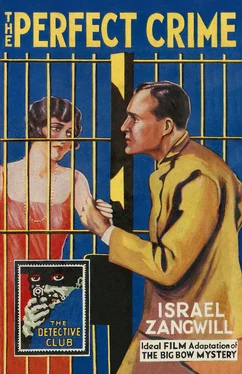By a JURYMAN: Did the news concern him?
MORTLAKE: Only impersonally. He knew my friend, and was keenly sympathetic when one was in trouble.
CORONER: Could you show the jury the letter you received?
MORTLAKE: I have mislaid it, and cannot make out where it has got to. If you, sir, think it relevant or essential, I will state what the trouble was.
CORONER: Was the toothache very violent?
MORTLAKE: I cannot tell. I think not, though he told me it had disturbed his rest the night before.
CORONER: What time did you leave him?
MORTLAKE: About twenty to ten.
CORONER: And what did you do then?
MORTLAKE: I went out for an hour or so to make some inquiries. Then I returned, and told my landlady I should be leaving by an early train for—for the country.
CORONER: And that was the last you saw of the deceased?
MORTLAKE ( with emotion ): The last.
CORONER: How was he when you left him?
MORTLAKE: Mainly concerned about my trouble.
CORONER: Otherwise you saw nothing unusual about him?
MORTLAKE: Nothing.
CORONER: What time did you leave the house on Tuesday morning?
MORTLAKE: At about five and twenty minutes past four.
CORONER: Are you sure that you shut the street door?
MORTLAKE: Quite sure. Knowing my landlady was rather a timid person, I even slipped the bolt of the big lock, which was usually tied back. It was impossible for anyone to get in even with a latchkey.
Mrs Drabdump’s evidence (which, of course, preceded his) was more important, and occupied a considerable time, unduly eked out by Drabdumpian padding. Thus she not only deposed that Mr Constant had the toothache, but that it was going to last about a week; in tragi-comic indifference to the radical cure that had been effected. Her account of the last hours of the deceased tallied with Mortlake’s, only that she feared Mortlake was quarrelling with him over something in the letter that came by the nine o’clock post. Deceased had left the house a little after Mortlake, but had returned before him, and had gone straight to his bedroom. She had not actually seen him come in, having been in the kitchen, but she heard his latchkey, followed by his light step up the stairs.
A JURYMAN: How do you know it was not somebody else? ( Sensation, of which the juryman tries to look unconscious. )
WITNESS: He called down to me over the banisters, and says in his sweetish voice: ‘Be hextra sure to wake me at a quarter to seven, Mrs Drabdump, or else I shan’t get to my tram meeting.’
( Juryman collapses. )
CORONER: And did you wake him?
MRS DRABDUMP ( breaking down ): Oh, my lud, how can you ask?
CORONER: There, there, compose yourself. I mean did you try to wake him?
MRS DRABDUMP: I have taken in and done for lodgers this seventeen years, my lud, and have always gave satisfaction; and Mr Mortlake, he wouldn’t ha’ recommended me otherwise, though I wish to Heaven the poor gentleman had never—
CORONER: Yes, yes, of course. You tried to rouse him?
But it was some time before Mrs Drabdump was sufficiently calm to explain that though she had overslept herself, and though it would have been all the same anyhow, she had come up to time. Bit by bit the tragic story was forced from her lips—a tragedy that even her telling could not make tawdry. She told with superfluous detail how—when Mr Grodman broke in the door—she saw her unhappy gentleman lodger lying on his back in bed, stone dead, with a gaping red wound in his throat; how her stronger-minded companion calmed her a little by spreading a handkerchief over the distorted face; how they then looked vainly about and under the bed for any instrument by which the deed could have been done, the veteran detective carefully making a rapid inventory of the contents of the room, and taking notes of the precise position and condition of the body before anything was disturbed by the arrival of gapers or bunglers; how she had pointed out to him that both the windows were firmly bolted to keep out the cold night air; how, having noted this down with a puzzled, pitying shake of the head, he had opened the window to summon the police, and espied in the fog one Denzil Cantercot, whom he called and told to run to the nearest police station and ask them to send on an inspector and a surgeon. How they both remained in the room till the police arrived, Grodman pondering deeply the while and making notes every now and again, as fresh points occurred to him, and asking her questions about the poor, weak-headed young man. Pressed as to what she meant by calling the deceased ‘weak-headed’, she replied that some of her neighbours wrote him begging letters, though, Heaven knew, they were better off than herself, who had to scrape her fingers to the bone for every penny she earned. Under further pressure from Mr Talbot, who was watching the inquiry on behalf of Arthur Constant’s family, Mrs Drabdump admitted that the deceased had behaved like a human being, nor was there anything externally eccentric or queer in his conduct. He was always cheerful and pleasant spoken, though certainly soft—God rest his soul. No; he never shaved, but wore all the hair that Heaven had given him.
By a JURYMAN: She thought deceased was in the habit of locking his door when he went to bed. Of course, she couldn’t say for certain. ( Laughter. ) There was no need to bolt the door as well. The bolt slid upward, and was at the top of the door. When she first let lodgings, her reasons for which she seemed anxious to publish, there had only been a bolt, but a suspicious lodger, she would not call him a gentleman, had complained that he could not fasten his door behind him, and so she had been put to the expense of having a lock made. The complaining lodger went off soon after without paying his rent. ( Laughter. ) She had always known he would.
CORONER: Was deceased at all nervous?
WITNESS: No, he was a very nice gentleman. ( A laugh. )
CORONER: I mean did he seem afraid of being robbed?
WITNESS: No, he was always goin’ to demonstrations. ( Laughter. ) I told him to be careful. I told him I lost a purse with 3s. 2d. myself on Jubilee Day.
Mrs Drabdump resumed her seat, weeping vaguely.
CORONER: Gentlemen, we shall have an opportunity of viewing the room shortly.
The story of the discovery of the body was retold, though more scientifically, by MR GEORGE GRODMAN, whose unexpected resurgence into the realm of his early exploits excited as keen a curiosity as the reappearance ‘for this occasion only’ of a retired prima donna. His book, Criminals I Have Caught , passed from the twenty-third to the twenty-fourth edition merely on the strength of it. Mr Grodman stated that the body was still warm when he found it. He thought that death was quite recent. The door he had had to burst was bolted as well as locked. He confirmed Mrs Drabdump’s statement about the windows; the chimney was very narrow. The cut looked as if done by a razor. There was no instrument lying about the room. He had known the deceased about a month. He seemed a very earnest, simple-minded young fellow who spoke a great deal about the brotherhood of man. (The hardened old man-hunter’s voice was not free from a tremor as he spoke jerkily of the dead man’s enthusiasms.) He should have thought the deceased the last man in the world to commit suicide.
MR DENZIL CANTERCOT was next called. He was a poet. ( Laughter. ) He was on his way to Mr Grodman’s house to tell him he had been unable to do some writing for him because he was suffering from writer’s cramp, when Mr Grodman called to him from the window of No. 11 and asked him to run for the police. No, he did not run; he was a philosopher. ( Laughter. ) He returned with them to the door, but did not go up. He had no stomach for crude sensations. ( Laughter. ) The grey fog was sufficiently unbeautiful for him for one morning. ( Laughter. )
Читать дальше












